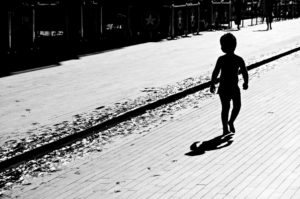The following is from Outside Is the Ocean, by Matthew Lansburgh. Published by the University of Iowa Press, 2017. Used with permission.
California
Heike wonders whether she’s made a mistake. She opens her handbag and examines a small piece of paper—TWA 302 11:23—then looks at the sign near the doorway where, until a few moments ago, passengers from her husband’s plane were still disembarking. Around her, people embrace one another, some with tears in their eyes.
“Everything is fine, mein Schatz,” she tells Stewart, who sits in his stroller, wearing corduroy pants and a shirt folded once at the sleeves. “Daddy is getting his things. He must have been late to the airport and was forced to sit at the back of the plane.” But even as Heike formulates these sentences, she knows her explanation is unlikely. Raymond is not at the back of the plane. Raymond would have come down the walkway quickly, a bag in each hand. Could it be that she wrote down the wrong flight number?
Four nights ago, when the phone rang, it was half past one in the morning, and Heike fumbled with the receiver. “What’s going on over there?” Raymond asked, and she apologized as she tried to turn on the light. Her husband was calling from England, where he’d spent the past seven weeks doing research for a book on illuminated manuscripts. For days she’d hoped to receive a card or a letter. She sat near the phone each afternoon, when Stewart was taking his nap, willing it to ring. The call lasted three minutes at most. It was dark outside, and the bedroom was cold, and there was a bit of static on the line. Raymond told her his return would be delayed by two days, and then, before he hung up, he said something she did not understand. The word—or was it a phrase?—had a strong r sound, something with an r and a b or maybe a v.
Heike did not return the receiver to the cradle right away. The sound of the dial tone was strangely comforting, and, sitting on the edge of the bed, she imagined the voice of a friend. In California, before she’d moved to this town in the Rockies, Heike had rented a room from an elderly woman named Sylvia who liked to make large pots of soup with turnips and other root vegetables. Sometimes Heike thought about calling her on the phone. What would Heike say? Would she tell Sylvia the truth? My husband is going to leave me. I can tell by the way he flirts in front of my eyes. By the way he refuses to touch me.
Heike had seen Raymond meet a woman at a party last spring. The woman was poised and refined, and Raymond had walked across the room to get her a drink. Everything about her was perfect, even her name. Heike had studied the woman, Miss Elizabeth Brown, had watched her laugh at Raymond’s jokes, had envied her movie-star teeth. Of course that was the kind of person Raymond should be with. Heike told Raymond from the beginning that she herself was not right for him. She told him he should marry someone with a background like his, someone who had gone to college and had elegant taste.
“Don’t be ridiculous,” he said. “I love the fact that you grew up on a farm.”
And for a time Heike believed him, though the place she lived as a girl was not a farm. “We lived in a hut near a large forest,” she said on their first outing together. “There was no running water, but we had fat rabbits that we kept in a cage.”
“I’ve always had a thing for German girls,” he said when they first met. “I’ll bet you look great in a dirndl.” She was working as a teller at a bank, and, soon enough, her colleagues declared him smitten. Six times he brought chocolates and baskets of fruit.
“Mr. Winter, are you trying to get me into trouble?” she said, half joking with him. “If you are flirting with me and I make a mistake, they deduct the shortage from my paycheck.” She counted out his withdrawal, and he told her she had beautiful hands. “Enough now. There are customers waiting patient behind you in line.”
+++
Perhaps, as she fumbled with the pen, as she pressed the dry tip into the piece of paper on the nightstand, she reversed two of the numbers. Heike is new to the world of airports and flights. Her only trip by plane was with Raymond himself, after their wedding, from Los Angeles to Chicago, where his family lived. She’d been nervous to get on the aircraft, nervous and excited—and, as the plane lifted off, she squeezed her new husband’s hand. Their courtship had moved quickly. Night after night, he knocked on her door, bringing scarves and poems he’d written. “Come with me for a drive,” he pleaded. “The moon is so beautiful.” His fiancée had broken his heart, he confessed, and he couldn’t stand being alone. On the third night they drove to the top of a mountain, overlooking the beach and the sea, where he told her the names of the stars. He brought her a bouquet of dried peonies with lavender and rose hips. She didn’t ask why the flowers were dry.
“Excuse me, ma’am,” she says to a woman in a uniform here at the gate. “Would you be so kind and tell me whether there are any more passengers still leaving the aircraft?”
The woman turns out to be friendly. She tells Heike the plane is empty, but she offers to see whether Raymond was booked on the flight. The woman’s name is Michelle, a nice name, the kind of name Heike would have chosen for Stewart if he’d been a girl. She has make-up that is tastefully applied and a bosom that doesn’t call attention to itself. She peppers Heike with questions: Did Raymond spend the night in New York before catching his flight back to Denver? Could he have missed a connection and boarded a later flight? What was the name of the hotel where he’d stayed?
These are the things Heike herself should have asked. It would have been natural for a wife to ask her husband whether he would spend the night in New York before returning home. The plane from London to New York would have arrived in the late afternoon, and Raymond might not have been able to catch a flight to Denver until the next day. As Michelle turns to walk away, Heike wants to say something else. For a moment she wonders whether she should follow Michelle. Perhaps she would take pity on Heike. “Come home with me,” she might say. “You and your son can spend the night in our house.”
Heike stays where she is. In the distance, she thinks she can see Raymond now. A man, about Raymond’s height, in a blazer, is walking next to a woman. Could this be the same woman he met at the party in April? A professor from Raymond’s department was retiring, and Raymond had put on his tweed suit. Heike remembers standing in front of a painting of a lighthouse surrounded by lashing waves while Raymond talked to the woman, a librarian from England who’d come to Colorado to give lectures on Renaissance art.
“Elizabeth was really something,” he said on their way home. “Did you think she was striking?” Heike remembers feeling confused by the question, confused and almost ashamed.
“Striking?” she asked. “What means striking? Is she the mother of your child? Did she bear you a son?” She wonders how someone like Michelle would have reacted.
“Yes, Heike, she bore me a child. Didn’t you see her there with my children? They were wearing little yellow outfits and had teddy bears. Weren’t they cute?”
Stewart must be getting hungry now, Heike thinks. Soon it will be time for his nap. She observes the couple, and then, before she is certain, she surprises herself. She turns and walks away, pushing the stroller toward the long corridor with polished white floors.
+++
Driving home, she comes up with a plan. It is still early enough for her to pack up their things and stop at the bank. There are two suitcases in the basement she can use. They wouldn’t need much—just their clothes, her violin, and a few of Stewart’s stuffed animals. They can leave while it is still light, drive west to Grand Junction and spend the night in a hotel. Tomorrow, at sunrise, they can continue on to Cedar City. Heike wonders how many days it would take them to reach Ventana Beach. Four years ago, the drive from California took just two and a half days, though Raymond sped the whole way. They’d been married ten weeks when he accepted the job, telling her she should be proud.
By the time she pulls into the driveway, however, Heike’s plans have already begun to fray. Even if she took everything out of the household account, it wouldn’t be enough to make a new life. She tells herself that it must have been the day of Raymond’s return she misunderstood. His flight must be arriving tomorrow. The mistake is actually good luck, she decides. She was rushed getting ready this morning and the outfit she chose is not becoming on her.
The sky has been overcast for nearly a week, but after lunch the sun breaks through the clouds. “What shall we do, mein Liebchen?” she asks Stewart, who is playing with a fuzzel from his favorite green blanket. “Do you want to go to the pond with Mutti and make the duckies a little bit happy?” And when he nods yes, she smiles and puts her hand on his cheek. “We bring them some bread crumbs,” she says, taking heels of dark rye from beneath the sink. Even in deepest winter, she goes on walks with her son—bundles him up and pushes him down Warburt Lane and Beatrice Avenue and other streets whose names she’s learned to pronounce. Now and then she sees a familiar face, the wife of another professor or an elderly gentleman sweeping his porch, though she rarely does more than wave. In school, English was always her best subject, but here in America people talk quickly and sometimes—often—she still makes mistakes. Raymond likes to correct her. “Adverbs end in l-y,” he instructs.
All summer long she’s used her savings to pay the girl down the street, a high school student, to tutor her. “Even if it is a small thing, please correct me. It is very important that I make not so many grammatical errors.” She meets the girl three times a week. Yesterday they were practicing the past perfect tense: On Tuesday Eloise ate baked potatoes, but last week she had eaten nothing but ham.
Occasionally, on mornings when Heike feels more certain, she stops by the bakery and asks the man with the heavy beard whether he has any bread she can feed to the birds at the lake, the mother and her little duckies. Even to him, she calls them her duckies, and he smiles and hands her a loaf. Heike zips Stewart’s coat up to his chin. She ties off the bag of scraps she’s collected and tucks it into her pocket. Today she won’t stop at the baker’s. She turned thirty only recently, but already she feels she has made mistakes that cannot be undone.
Heike maneuvers the stroller onto the sidewalk and heads past the angular hedges and lawns. The air is crisp. When she was a girl, her mother took her up to the mountains on this kind of day to pick berries that were blue and black and bright red. They each carried a basket, and her mother taught her songs from the Gewandhaus choir.
At the lake, the ducks know that Heike and Stewart have brought something for them. Even before she’s untied the bag, they begin greeting her. Stewart’s hands are too small to break the bread into pieces, so Heike helps, handing him bite-size chunks. “Be a big boy and throw it as far as you can,” she says. “Make sure the little ones get a bit too. They’re also hungry.”
In California, in September, people are still wearing shorts. As a girl, she spent so many nights imagining what it would be like to walk without shoes on the sand. She saw photos in magazines of long strips of coast, with girls in bikinis and boys driving open-air cars, and she promised herself that when she was older she would move to America. “In California,” she wrote to her mother, “it is always sunny and nice.” She bought a postcard with palm trees, and she made a point of showing off the English she’d learned.
In the distance, Heike sees a woman walking, at the edge of the water, arm in arm with a man. The man stops and picks up a leaf from the ground. Soon, for a few short weeks, trees everywhere will light up the mountains with colors like pumpkins and squash. The forests will take on brilliant hues and then, suddenly, everything will change and the leaves will fall to the ground. Heike imagines Elizabeth Brown’s scarf in the wind—Raymond kissing her on the lips. She imagines him touching her hair. Her hair will have been touched by his hand.
Eventually, Heike’s legs grow heavy, her hands cold. She picks up her pace and pushes the stroller back home, along the sidewalks of tree-lined streets with houses where mothers peel carrots and put scalloped potatoes and green bean casseroles into hot ovens. Heike envies these women—women whose friends stop by, unannounced, for coffee and cake, whose children play in the backyard while their parents sit together reading the paper. Occasionally, she sees these women at the grocery store, standing near the bins of apples, exchanging gossip and recipes, and she thinks about reaching over to touch one of them and solicit advice.
Perhaps Raymond did not go away to meet this Elizabeth Brown. Perhaps he flew to London simply to photograph manuscripts for the book he is writing. Why be so suspicious? She is silly, letting her thoughts run away. Tomorrow Raymond will return and everything will be fine.
That night, after she puts Stewart to bed, Heike sits on the couch to watch some TV. Before Raymond left, he adjusted the antennas, but now when she turns on the television, most of the stations come in full of static. The only channel that works has a show about the dog Lassie and her family. Heike has seen the program a few times and likes it. She finds it incredible how well-trained the collie is and what a good companion she makes. Tonight Timmy dresses Lassie up as a swami so she can tell the fortunes of children.
When the show ends, she turns off the lights and heads back upstairs. In bed, she can’t fall asleep. Across the ocean, in Europe, it is almost certainly morning.
+++
Even before the sun has fully awakened, Heike is out of the bed, turning on the bathroom heater. She takes off her nightgown and looks at herself in the mirror. She regards herself. This is a term she learned recently from the book she is reading, a book in which the heroine has long blond hair and blue eyes and a mole, like Marilyn Monroe. The heroine regarded herself in the mirror of her dressing room. She looks at her reflection—her torso, her breasts, her hips and legs—a woman in a bathroom with cold tile floors and window panes that distort the garden below.
Her hair is not blond; it is red. She has thick wiry hair that she has hated since she was a girl. Dickes und widerspenstiges Haar, her mother always said. Too thick and unruly. Her hair is red and her eyes are brown, not blue or hazel or green. She has freckles and a slight overbite. Of course Raymond has grown tired of her. What man would want to be married to a woman with an overbite and hair like that girl from Sweden with the monkey?
A clear sky is a good sign, she thinks, as she stands at the closet, examining the selection before her. She chooses something in gray—the wool suit Raymond bought her three months after their first lunch together. “She needs to look dignified,” he told the attendants at the boutique, and at first she was flattered by the attention: women showing her fabrics, helping her try on pantsuits brought out on nice hangers. She’d never been to a store with couches and beautiful mirrors.
Heike powders her face and outlines her lips, applying the eye shadow recommended to her and the mascara that costs seventy-nine cents per slender tube. She puts her hair up in a bun. Yesterday was just a misunderstanding, she tells herself. Instead of Wednesday, Raymond must have said Thursday. Yesterday was her dress rehearsal, and today she is ready. She leaves herself plenty of time.
At the airport, Stewart sits in his stroller wearing a tan sweater, his hair nicely combed to the side. His mother stands beside him, watching the people step off the plane. Men in suits, carrying briefcases, women in high heels and hats. Heike is glad she and her son are dressed well; Raymond will see them and not be embarrassed. He will come down the corridor, in his long coat, with his leather satchel, and he will see his family waiting for him. She will embrace him and ask how his flight was. She will tell him that she and Stewart missed him and made him a pie. She arranges the words in her head, practicing the rules she has learned.
**
Matthew Lansburgh’s collection of linked stories, Outside Is the Ocean, won the 2017 Iowa Short Fiction Award. His fiction has appeared in Glimmer Train, Electric Literature, StoryQuarterly, Guernica, Ecotone, Michigan Quarterly Review, and Joyland, and has won awards from Columbia Journal and the Florida Review. In selecting his book as the winner of the Iowa Short Fiction Award, Andre Dubus III described Outside Is the Ocean as “mesmerizing.” For more information about Matthew’s book and his stories, please visit his website.







